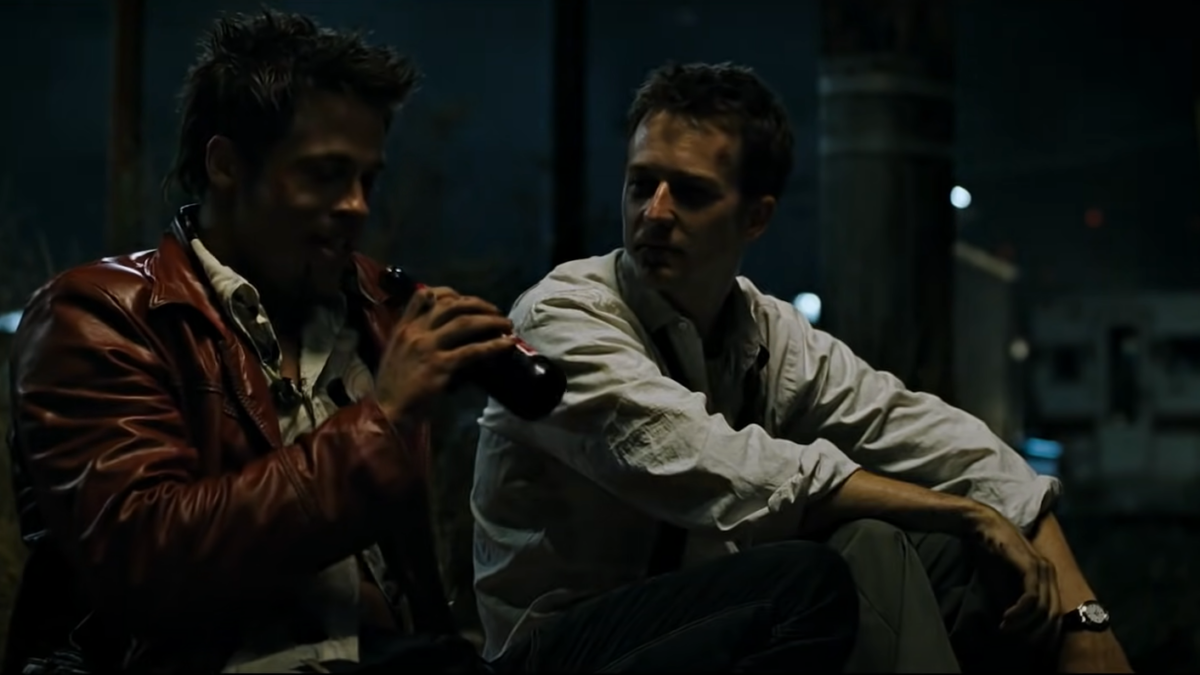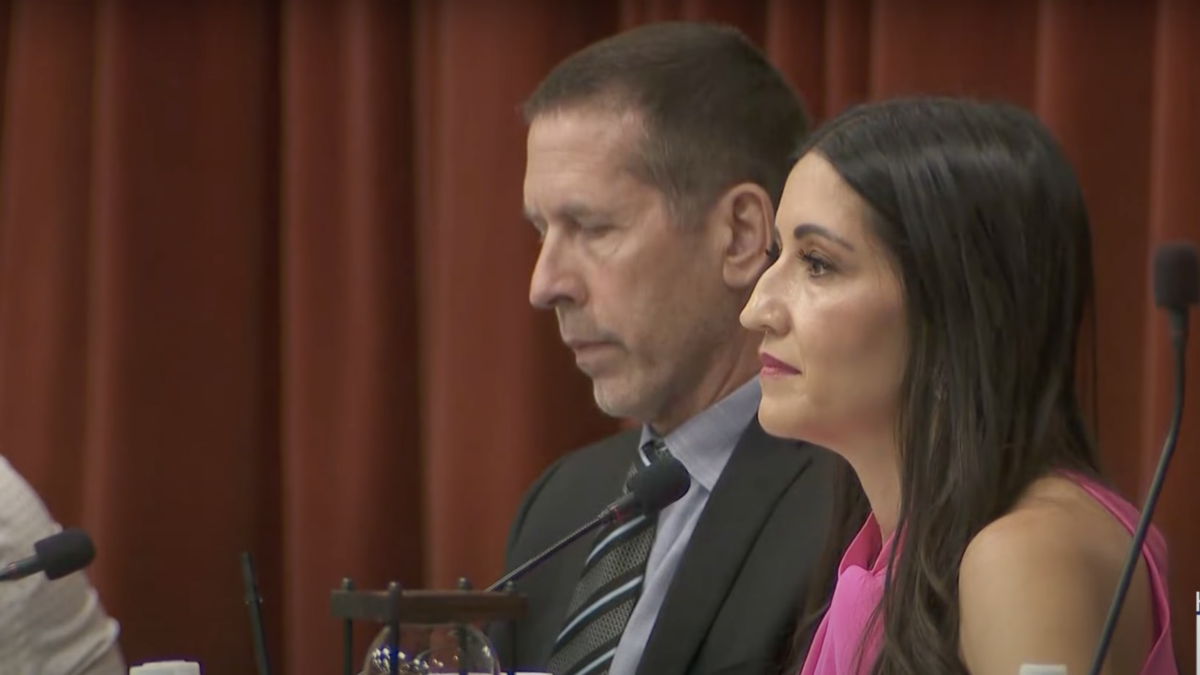Twenty-two years after its initial release, “Fight Club” still matters. Whether it’s the term “snowflake” or questions about being a man in the modern world, the story continues to resonate, particularly as more recent fictional offerings “are preachy exercises that bolster notions already fully embraced by their audience. No one is challenged, because being challenged means being offended.”
Lately, “Fight Club” has made its way to China via streaming service Tencent. But the ending was initially quite different than the one audiences elsewhere witnessed, with Tyler Durden and Marla watching buildings crumble as Pixies’ “Where is My Mind?” plays.
While Tencent reversed course, in a rare move to undo censorship rather than increase it, Chinese audiences saw the film cut before the explosions, followed by a black screen with text that reads:
Through the clue provided by Tyler, the police rapidly figured out the whole plan and arrested all criminals, successfully preventing the bomb from exploding. After the trial, Tyler was sent to a lunatic asylum, receiving psychological treatment. He was discharged from the hospital in 2012.
Such censorship is the price of admission for doing business in China. Its lucrative market is too tempting for Hollywood, which gleefully goes along with its edicts, including censoring items that might “undermine social stability.” The NBA similarly loves China, and Tencent, as do most big businesses, such as Nike, that need cheap wares to keep profit margins high.
But censorship like that would never happen here, right, especially not to another man known mostly for his love of fighting and asking questions?
Our Leftist Triumvirate
Except we’ve got Surgeon General Vivek Murthy calling for that lover of fighting and asking questions, one Joe Rogan, to be censored for spreading Covid “misinformation.” This is Vivek’s M.O. Last summer, he called for Big Tech to censor everyone he considers guilty of doing the same.
Not that he’s barking up the wrong tree. Big Tech loves to silence voices with which it disagrees and at this point is fully hand-in-glove with Big Government and Big Business. Our modern leftist triumvirate is united in its goals, and those goals aren’t big on old-school rugged American individualism and freedom.
It’s not just the surgeon general using a government perch to try to get Spotify to go after Rogan. Press Secretary Jen Psaki also weighed in on the popular podcaster saying, “This disclaimer is a positive step, but we want every platform to continue doing more to call out mis- and disinformation while also uplifting accurate information.”
The First Amendment may be often misapplied in conversation, online and off, but when an official with the ruling party starts suggesting to private businesses who should be allowed to speak and what they should be allowed to say, government is colluding with the private sector to kill speech.
When Those Fighting the Man Become the Man
What’s especially galling about it all is that aging hippies, the former truth-to-power and let-your-freak-flag-fly gang, are with the government in calling for less freedom and supporting the Bigs. You know, the generation who grew up espousing ideas like the one captured in this rambling Timothy Leary quote:
Throughout human history, as our species has faced the frightening, terrorizing fact that we do not know who we are, or where we are going in this ocean of chaos, it has been the authorities — the political, the religious, the educational authorities — who attempted to comfort us by giving us order, rules, regulations, informing — forming in our minds — their view of reality. To think for yourself you must question authority and learn how to put yourself in a state of vulnerable open-mindedness, chaotic, confused vulnerability to inform yourself.
Thinking for yourself and putting yourself in a state of vulnerable open-mindedness sounds a lot like what Rogan does, in addition to sharing a fondness for the drugs Leary often recommended.
Now those same children of the 1960s are saying, “Don’t think for yourself. Trust authority,” with Neil Young playing the pioneer, being the first to pull his catalog from Spotify because the service refused to fire Rogan. Joni Mitchell quickly followed suit, as did a handful of other aging hippies plus India Arie. Truly, this was a brave stance for these artists, particularly Young, who has long had beef with Spotify over its sound quality and whose announcement was surely not related to his new partnership with Amazon Music in any way.
The Twitter Mob Gets Results
Regardless, Spotify still got the message, issuing a statement saying in part:
We are working to add a content advisory to any podcast episode that includes a discussion about COVID-19. This advisory will direct listeners to our dedicated COVID-19 Hub, a resource that provides easy access to data-driven facts, up-to-date information as shared by scientists, physicians, academics and public health authorities around the world, as well as links to trusted sources. This new effort to combat misinformation will roll out to countries around the world in the coming days. To our knowledge, this content advisory is the first of its kind by a major podcast platform.
This is another way of saying that the company has decided to add a digital parental warning label to Rogan’s podcast. That’ll do the trick!
Rogan also issued a statement, saying, “I’m not trying to promote misinformation. I’m not trying to be controversial. I’ve never tried to do anything with this podcast other than just talk to people and have interesting conversations.”
Rogan needs to learn that in modern times, it’s better to offer preachy exercises that bolster notions already fully embraced by Young and Mitchell’s audiences rather than challenging anyone and appealing to his own audience.
This Isn’t About Joe Rogan, It’s About Dissent
Not that Rogan himself is even the source of people’s frustrations. As Ben Domenech noted, “He asks open-ended and often meandering questions before driving down to a point, seeking an answer from the person sitting across from him in ways that are, given the marathon length and intellectual breadth of the show, impossible to filibuster.”
This sets Rogan apart from Durden and “Fight Club.” While Durden did ask questions like “Guys, what would you wish you’d done before you die?” and “Which celebrity would you like to fight?,” his goal was destruction. He did seek to challenge those in his orbit, but he wasn’t doing so out of curiosity or to expose them to a wide range of opinions. He wanted to smash the state, which is why the movie’s ending in China is as it is. China cannot tolerate even fictitious dissent.
Rogan’s appeal is not in his dissent, but because he asks the questions that others aren’t, because they don’t fit the narrative. For now, he’s still on the air, although the attacks on him are escalating. Given that the Wuhan virus is not the only thing from China infecting our body politic, it’s likely only a matter of time until his podcast is replaced with a message from the Cathedral similar to the ending “Fight Club” initially displayed to the communist slave state.









